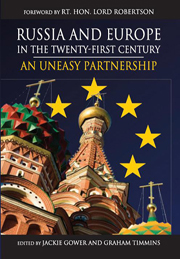Book contents
- Frontmatter
- Contents
- List of Contributors
- Acknowledgements
- List of Abbreviations/Acronyms
- Foreword Russia and Europe
- Preface
- Introduction Russia and Europe: What Kind of Partnership?
- PART 1 Russia looking West
- PART 2 Europe looking East
- PART 3 Partnership in Practice
- Conclusion Russia and Europe: An Uneasy Partnership 289
- Index
- More Titles in this series
Preface
Published online by Cambridge University Press: 05 March 2012
- Frontmatter
- Contents
- List of Contributors
- Acknowledgements
- List of Abbreviations/Acronyms
- Foreword Russia and Europe
- Preface
- Introduction Russia and Europe: What Kind of Partnership?
- PART 1 Russia looking West
- PART 2 Europe looking East
- PART 3 Partnership in Practice
- Conclusion Russia and Europe: An Uneasy Partnership 289
- Index
- More Titles in this series
Summary
When in 2006 the original edition of this publication was completed, there were growing concerns regarding the state of Russian-European relations. Russia was in the process of becoming a more assertive energy power, the values gap between Russia and the West was perceived to be widening with the latter facing a difficult challenge of balancing values against interests in the pursuit of a strategic partnership with the Russian Administration.
Since this time, the relationship has become even more problematic. The impact of the European Union's enlargement to the East in 2004 has been extensive in terms of policy formulation on Russia, and has seen an emerging rift between accommodationist and more hard line member states. The breakdown of negotiations on a new treaty agreement in 2007 presented political challenges for both Russia and the EU, and it remains to be seen what kind of deal will be reached in the course of 2009. The election of Dmitri Medvedev in March 2008 prompted speculation regarding the relationship between the new President and Vladimir Putin, who had taken up the post of Prime Minister, and the future course of Russian foreign and domestic policy, particularly in terms of the ‘shared neighbourhood’, comprising the former Soviet republics to Russia's western and eastern borders. The outbreak of violent conflict in South Ossetia in August 2008 has had a detrimental effect on Russia's relations with the European Union, NATO and the US, and has prompted discussion whether we are witnessing the onset of a new Cold War.
- Type
- Chapter
- Information
- Russia and Europe in the Twenty-First CenturyAn Uneasy Partnership, pp. xix - xxPublisher: Anthem PressPrint publication year: 2007



